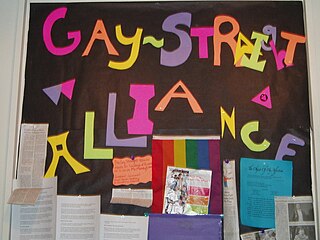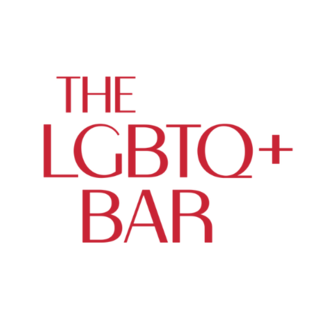Related Research Articles

The LGBT community is a loosely defined grouping of lesbian, gay, bisexual, and transgender individuals united by a common culture and social movements. These communities generally celebrate pride, diversity, individuality, and sexuality. LGBT activists and sociologists see LGBT community-building as a counterweight to heterosexism, homophobia, biphobia, transphobia, sexualism, and conformist pressures that exist in the larger society. The term pride or sometimes gay pride expresses the LGBT community's identity and collective strength; pride parades provide both a prime example of the use and a demonstration of the general meaning of the term. The LGBT community is diverse in political affiliation. Not all people who are lesbian, gay, bisexual, or transgender consider themselves part of the LGBT community.

The Human Rights Campaign (HRC) is an American LGBTQ advocacy group. It is the largest LGBTQ political lobbying organization within the United States. Based in Washington, D.C., the organization focuses on protecting and expanding rights for LGBTQ individuals, including advocating for same-sex marriage, anti-discrimination and hate crimes legislation, and HIV/AIDS advocacy. The organization has a number of legislative initiatives as well as supporting resources for LGBTQ individuals.
GLSEN is an American education organization working to end discrimination, harassment, and bullying based on sexual orientation, gender identity and gender expression and to prompt LGBT cultural inclusion and awareness in K-12 schools. Founded in 1990 in Boston, Massachusetts, the organization is now headquartered in New York City and has an office of public policy based in Washington, D.C.

A gay–straight alliance, gender–sexuality alliance (GSA) or queer–straight alliance (QSA) is a student-led or community-based organization, found in middle schools, high schools, colleges, and universities. These are primarily in the United States and Canada. Gay–straight alliance is intended to provide a safe and supportive environment for lesbian, gay, bisexual, transgender, and all LGBTQ+ individuals, children, teenagers, and youth as well as their cisgender heterosexual allies. The first GSAs were established in the 1980s. Scientific studies show that GSAs have positive academic, health, and social impacts on schoolchildren of a minority sexual orientation and/or gender identity. Numerous judicial decisions in United States federal and state court jurisdictions have upheld the establishment of GSAs in schools, and the right to use that name for them.
This is a list of notable events in the history of LGBT rights that took place in the year 1974.

Urvashi Vaid was an Indian-born American LGBT rights activist, lawyer, and writer. An expert in gender and sexuality law, she was a consultant in attaining specific goals of social justice. She held a series of roles at the National LGBTQ Task Force, serving as executive director from 1989-1992 — the first woman of color to lead a national gay-and-lesbian organization. She is the author of Virtual Equality: The Mainstreaming of Gay and Lesbian Liberation (1995) and Irresistible Revolution: Confronting Race, Class and the Assumptions of LGBT Politics (2012).
The origin of the LGBT student movement can be linked to other activist movements from the mid-20th century in the United States. The Civil Rights Movement and Second-wave feminist movement were working towards equal rights for other minority groups in the United States. Though the student movement began a few years before the Stonewall riots, the riots helped to spur the student movement to take more action in the US. Despite this, the overall view of these gay liberation student organizations received minimal attention from contemporary LGBT historians. This oversight stems from the idea that the organizations were founded with haste as a result of the riots. Others historians argue that this group gives too much credit to groups that disagree with some of the basic principles of activist LGBT organizations.

The National LGBTQ+ Bar Association, formerly the National Lesbian and Gay Law Association and the National LGBT Bar Association, is a national association of lawyers, judges and other legal professionals, law students, activists, and affiliated lesbian, gay, bisexual, transgender legal organizations. It was formally founded in 1989 and became an official affiliate of the American Bar Association in 1992. The association is headquartered in Washington, D.C., and its current executive director is D’Arcy Kemnitz.
The Spectrum Center is an office at the University of Michigan in Ann Arbor that is dedicated to providing education, outreach, and advocacy for the lesbian, gay, bisexual, transgender, queer, and allied (LGBTQA) community. Since the organizations' creation in 1971, the Spectrum Center's mission statement has been to "enrich the campus experience and develop students as individuals and as members of the LGBTQA community." The organization achieves this through student-centered education, outreach, advocacy and support.

Historically speaking, lesbian, gay, bisexual, and transgender (LGBT) people have not been given equal treatment and rights by both governmental actions and society's general opinion. Much of the intolerance for LGBT individuals come from lack of education around the LGBT community, and contributes to the stigma that results in same-sex marriage being legal in few countries (31) and persistence of discrimination, such as in the workplace.

Equality Florida is a political advocacy group that advocates for civil rights and protections for lesbian, gay, bisexual, transgender, and queer (LGBTQ) residents of the U.S. state of Florida. Equality Florida consists of two organizations - Equality Florida Institute, Inc., the 501(c)(3) educational charity and Equality Florida Action, Inc., the 501(c)(4) advocacy organization. Together with over 300,000 supporters, these organizations form the largest civil rights organization dedicated to Florida's LGBTQ community.
This article concerns LGBT history in Florida.

Athlete Ally is a nonprofit LGBTQ athletic advocacy group based in the United States. The group aims to make athletic communities more inclusive and less discriminatory and helping athletes to advocate for LGBTQ equality.

Gloria Casarez was an American civil rights leader and LGBT activist in Philadelphia. Casarez served as Philadelphia's first director of lesbian, gay, bisexual and transgender (LGBT) affairs. During her tenure as director, Philadelphia ranked as the number one city nationwide for LGBT equality. Casarez served as the executive director of Gay and Lesbian Latino AIDS Education Initiative (GALAEI) from 1999 to 2008.
Ronni Lebman Sanlo is the Director Emeritus of the UCLA Lesbian Gay Bisexual Transgender Center and an authority on matters relating to LGBT students, faculty and staff in higher education. She recognized at an early age that she was a lesbian, but was too afraid to tell anybody. Sanlo went to college then married and had two children. At the age of 31, Ronni came out and lost custody of her young children. The treatment toward the LBGT community and her rights as a mother are what gave Sanlo the drive to get involved in activism and LGBT politics.
Homosocialization or LGBT socialization is the process by which LGBT people meet, relate and become integrated in the LGBT community, especially with people of the same sexual orientation and gender identity, helping to build their own identity as well.

Dragonsani "Drago" Renteria is a deaf Chicano transgender man, CEO of DeafVision, founder and executive director of Deaf Queer Resource Center (DQRC) and long-time resident of San Francisco.
Reverend Cedric A. Harmon is the Executive Director of Many Voices: A Black Church Movement for LGBT Justice and a speaker, writer, and activist. He is recognized as having taken a "leading role in trying to convince the faithful to support LGBT rights," his work acknowledged in the National Park Service 2016 Centennial report LGBTQ America: A Theme Study of Lesbian, Gay, Bisexual, Transgender, and Queer History. He has also written for outlets such as the Huffington Post and the Advocate.

In Washington, D.C., LGBT culture is heavily influenced by the U.S. federal government and the many nonprofit organizations headquartered in the city.
References
- ↑ Broderick, Patricia M. (2003-11-30). "Colleges and Universities". Encyclopedia of Lesbian, Gay, Bisexual and Transgendered History in America. 1: 232–237.
- ↑ "Lavender Graduation". Human Rights Campaign. Retrieved 15 February 2015.
- ↑ "About Ronni". Ronnisanlo.com. Retrieved 15 February 2015.
- 1 2 "Lavender Graduation tradition celebrates LGBT students". USA TODAY College. Retrieved 15 February 2015.
- ↑ "Lavender Graduation: A Time for Celebration". Campus Pride. Retrieved 15 February 2015.
- 1 2 3 "Lavender Graduation | Human Rights Campaign". Human Rights Campaign. Retrieved 2018-10-13.